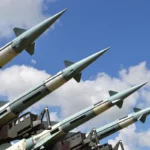Summary by Geopolist | Istanbul Center for Geopolitics:
The article “How Israel has always rejected a Palestinian state” from The New Arab discusses Israel’s consistent opposition to the establishment of a Palestinian state. It highlights a recent Knesset resolution rejecting Palestinian statehood and the historical context of Israel’s policies and actions that have prevented the creation of a Palestinian state. The article examines the role of various Israeli political parties, the impact of international opinions, and the long-term implications of these policies on the Israeli-Palestinian conflict.
Read more below.
Endless occupation: How Israel has always rejected a Palestinian state
This month, Israel’s parliament, known as the Knesset, overwhelmingly passed a resolution rejecting the establishment of a Palestinian state.
Passing with a 68-9 majority, the resolution “firmly opposes the establishment of a Palestinian state west of Jordan”.
“Promoting the idea of a Palestinian state at this time will be a reward for terrorism and will only encourage Hamas and its supporters to see this as a victory, thanks to the massacre of October 7, 2023, and a prelude to the takeover of jihadist Islam in the Middle East,” the resolution said.
Parties in Prime Minister Benjamin Netanyahu’s coalition co-sponsored the resolution with right-wing parties from the opposition. It also received support from the centrist National Unity party led by former deputy prime minister, Benny Gantz.
Opposition Leader Yair Lapid from the centre-left Yesh Atid party and lawmakers from the Labour Party abstained from voting. Lapid has advocated for a two-state solution, with an Israeli state alongside a Palestinian state. The only lawmakers to vote against the resolution were from the Palestinian-majority Ra’am and Hadash-Ta’al parties.
“If you look at all of the political parties’ platforms, they don’t believe in Palestinian freedom at all,” Palestinian human rights lawyer Diana Buttu told The New Arab.
“When they talk about a state – and very few of them do – they’re not talking about ending the occupation. They’re talking about something less than a state, just something that they can say they’ve gotten rid of Palestinians. But they’re never talking about ending control over Palestinian lives.”
Buttu noted the timing of the resolution’s vote is noteworthy, which came just a day before the International Court of Justice (ICJ) ruled Israel’s occupation of the West Bank, including East Jerusalem, was unlawful.
“Israel is sending a very clear message that they will never end the occupation, that it doesn’t matter what the ICJ says, and it doesn’t matter what the world says, they’re going to hold onto it,” Buttu said.
Currently, 145 countries recognise a Palestinian state, with eight making this declaration since Israel launched its brutal war on Gaza in October 2023. Amid this increasing support, Palestinian journalist Ramzy Baroud assessed that Israel is reacting to intensifying international pressure.
“The Israeli vote was a message to these countries that Israel opposes the very concept of a Palestinian state, and that Tel Aviv remains unperturbed by growing recognitions of Palestine,” Baroud told TNA.
“Yet, in doing so, Israel in fact reflected its lingering fear that Palestinian sovereignty and statehood might not be entirely dependent on Israeli wishes and whims – as recent events in Gaza have shown.”
Two-state solution?
While long touted by the international community, including the United States, a two-state solution has been a point of contention in Israeli politics. Besides Lapid, the only other Israeli leaders to express support for this proposal are former prime ministers Ehud Barak and Ehud Olmert and current Israeli president Isaac Herzog.
While never explicitly calling for the creation of a Palestinian state, Israeli Prime Minister Yitzhak Rabin moved the needle slightly when signing the Oslo Accords, a peace deal meant to establish two states, but was shot dead by an Israeli extremist six weeks after signing the second part of the agreement in 1995.
Even with some vocal Israeli support for Palestinian statehood, action toward this aim has been minimal at best.
“It’s confirmation of what we Palestinians knew all along is that there is no ‘peace camp’ [in Israel],” Joharah Baker from MIFTAH, a Palestinian organisation committed to Palestinian nation-building, told TNA.
Israelis argue the Oslo Accords failed with the outbreak of the Second Intifada (Palestinian uprising) in 2000, claiming the Palestinian side was returning to violence and not a genuine partner for peace.
In reality, Netanyahu’s first premier term from 1996 to 1999, during which he strongly denounced the deal, along with increasing Israeli settlement expansion in the occupied West Bank, served to shrink the possibility of achieving a contiguous Palestinian state.
“No Israeli leader has ever carried out any earnest effort to bring about a truly independent Palestinian state. Yet, no one, since the Oslo Accords has opposed Palestinian sovereignty as much as Netanyahu,” Baroud said.
For Sally Abed, an activist with Standing Together, an anti-occupation movement made up of Jewish and Palestinian Israeli citizens, the recent vote validates the lack of political will within Israeli politics in establishing a Palestinian state – again an outcome of Netanyahu as Israel’s longest-serving prime minister.
“In the last two decades or so, under the reign of Netanyahu, we saw the complete erasure of this topic,” Abed said.
Some experts assert the Israeli government isn’t all to blame, though, but rather the international culture of impunity Israel enjoys.
“[Two states] is something that can still be implemented, but it has also become obsolete because the conditions required are clearly not going to happen,” Palestinian-Dutch analyst, Mouin Rabbani, told TNA.
“How the West has responded to the ICJ’s advisory ruling and how they’ve responded to this resolution: either pretended it didn’t happen or don’t take it seriously.”
Following the ICJ ruling, the US State Department criticised the court’s opinion saying it “will complicate efforts to resolve the conflict”.
Ultimately, the surge of Israeli right-wing fervour under Netanyahu coupled with a global lack of accountability is why Palestinians emphasise that an Israeli peace partner has never existed. And with this Knesset vote, that myth has now been debunked.
“The Israeli government, even when it was Labour, did not really work towards a two-state solution,” Baker said. “This is proof that was always lip service.”
By: Jessica Buxbaum – a Jerusalem-based journalist covering Palestine and Israel. Her work has been featured in Middle East Eye, The National, and Gulf News.
Follow her on Twitter: @jess_buxbaum
Source: The New Arab







